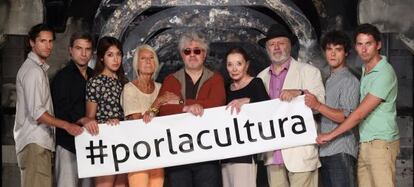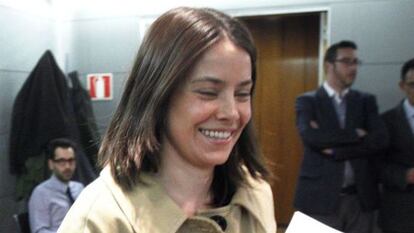Arts and entertainment industry calls on government to reduce sales tax
Concert halls and theaters say attendance has fallen by up to a third due to 21 percent VAT hike


Spain’s arts and entertainment sector faces “disaster” as a result of the government’s decision two years ago to apply a 21-percent sales tax to movie, concert and theater tickets, according to an open letter from industry representatives presented to Prime Minister Mariano Rajoy last week.
The letter, which pointed out that the sector contributes four percent of Spain’s gross domestic product, and employs some 150,000 people in 4,000 businesses, was delivered to the offices of the ruling Popular Party by a delegation of five representatives of the 14 nationwide federations that make up the Union of Culture Industry Business Associations on July 18.
“Short-term gains”
- Ramon Colom, one of Spain's leading film producers, pointed out during the presentation of the letter: "for every euro that the government provides to the film industry, it gets two back."
- The Spanish government has cut funding to the film industry from €49 million in 2012, to €39 million in 2013, and to €33.7 million this year. In Italy, government funding for this year will be €70.4 million; in the United Kingdom, €120 million; in Germany €340 million; and in France €770 million
- Eight Basque surnames, a Spanish production that has taken €55 million this year, €15 million of which goes to the government in sales tax. "But has anybody asked how much money we have lost?" asks Colom. "The sales tax may have put money into the state's coffers over the last two years, but it's a short-term gain, because businesses are closing, tax revenue is actually falling, and so are social security contributions, while unemployment benefit costs are rising."
- According to Colom, Spanish film budgets have fallen through the floor: the average cost of making a movie in Spain now is €1.5 million, down from €3 million in 2009. Only 18 percent of films have a budget of more than €5 million.
Sales tax, or VAT, was raised from eight to 21 percent in September 2012. Since then, say sector representatives, there has been a 30-percent drop in cinema, theater, concert and dance attendances, along with a “drastic reduction in the ability to produce new content, one that will be difficult to recover from, and that has badly hit businesses, which are closing down: exposing the total uselessness of a measure that is as absurd as it is destructive.”
The sector is accusing the government of needlessly targeting it: Spain is alone among EU nations in imposing such a high level of sales tax on the arts. In France the figure is five percent; in Greece, nine percent, and 13 percent in Portugal. “This shows that it isn’t Brussels that is dictating taxes; countries that have been bailed out by the EU have not been required to hike sales tax in this area: the government has no excuse,” continues the letter.
The five-member delegation was made up of Ramon Colom, the president of FAPAE, which represents film producers; Jesús Cimarro, president of FAETEDA, which represents theater and dance companies; Juan Ramón Gómez Fabra, president of FECE, the body that represents cinema owners; Pascual Egea, president of the APM, the association of music promoters; and Emilo Santamaría, president of ARTE, which represents sound and lighting companies.
Spain is alone among EU nations in imposing such a high level of sales tax on the arts
Gómez Fabra says that 61 movie houses closed last year, with the loss of 212 screens, while box office takings fell by 22 percent on the previous year, and 12 percent of jobs were lost over the same period. “We have been hit first by piracy [unauthorized downloading of films from the internet], and now by VAT. We could have dealt with a two-percent increase, but 13 percent has been too much. The situation is very worrying. The secretary of state for finance, Miguel Ferre talks about us insultingly, while the culture minister is nowhere to be seen. For the sake of €60 million in extra tax revenue in the case of movie theaters, they are killing any future we might have.” Cimarro says that the industry expects the tax to be lowered between now and September, reminding the premier that that the heads of the regional governments of Madrid, Extremadura, and Castilla y León have publically supported calls for the sales tax on the arts sector to be reduced, and that the deputy prime minister has said that a reduction is being looked into.
“It’s easy to destroy, but building is hard work, and we are looking at a bleak arts scene for decades to come,” says Colom, adding: “This country has significant cultural potential, but we are being marginalized and punished. We are paying for a crisis that is largely the responsibility of our political representatives.”
You can’t compare going to see a work by Lope de Vega with buying a fur coat”
The letter sent to the prime minister did not say what the arts industry will do if in September the government doesn’t reduce sales tax: Colom has called for “creative measures”, Cimarro says that “we’re working on some ideas,” while Gómez Fabra adds that finding consensus across such a wide range of views will be difficult, also pointing out that the tax hike has prompted many companies to operate in the hidden economy. For Colom, the nub of the question is that the tax implies that the arts are a luxury item: “You can’t compare going to see a work by Lope de Vega with buying a fur coat. The Spanish people do not deserve this sales tax.”
Head of government-run film industry body resigns

Susana de la Sierra, the director general of the Institute of Cinematography and the Audiovisual Arts (ICAA), has resigned. De la Sierra, aged 39, a lecturer in Administrative Law, was appointed by the government to head the public body that oversees and helps fund the film industry in January 2012 following the Popular Party’s victory in the November 2011 elections. She has yet to make a public statement explaining her decision, but sources in the Spanish film industry say that she had grown frustrated at government policy that has seen reduced state funding for the film sector, as well as its refusal to provide tax breaks that had been agreed between the sector and senior members of the administration, as well as at the continued negative impact of the 21-percent sales tax imposed in September 21 on movie tickets. “She’s leaving, she’s not been sacked,” says one leading film producer who asked not to be named.
Finance Minister Cristóbal Montoro announced in June that tax breaks for film budgets would remain at 20 percent on the first €1 million, and then 18 percent on the remainder, a move that insiders say prompted De la Sierra’s decision.
They add that the Finance Ministry has made it “impossible” to adopt new measures that might establish a new model for Spain’s movie industry at a time of crisis. Last December, in an interview with the SER radio network about the difficulties she faced, and the evident lack of support from the finance ministry, De la Sierra was asked why she hadn’t already resigned, answering that she still believed that the situation could be improved. “But all doors have been closed to her. She has done as much as she could,” said the film producer quoted above.
When De la Sierra, who has never worked in the film industry, took over the ICAA, its budget was €49 million, a figure that has since been cut to €33.7 million. The Finance Ministry has yet to release some €40 million it agreed to pay Spanish production companies for films made in 2012. De la Sierra warned in November of her concern about this, saying: “We cannot just stop paying.”
The ministry has also refused to increase tax breaks to film production companies. The movie industry had proposed tax breaks of between 25 and 30 percent. Montoro eventually agreed to a figure of 20 percent. In France, Germany and Italy, film productions receive tax breaks of up to 40 percent, in the United Kingdom, the figure is around 25 percent.
The post of director general of the ICAA has proved something of a poisoned chalice over the years, and few occupants of the role have finished their term in office. “It is a position that has no political power, but is very visible,” say industry insiders.
Tu suscripción se está usando en otro dispositivo
¿Quieres añadir otro usuario a tu suscripción?
Si continúas leyendo en este dispositivo, no se podrá leer en el otro.
FlechaTu suscripción se está usando en otro dispositivo y solo puedes acceder a EL PAÍS desde un dispositivo a la vez.
Si quieres compartir tu cuenta, cambia tu suscripción a la modalidad Premium, así podrás añadir otro usuario. Cada uno accederá con su propia cuenta de email, lo que os permitirá personalizar vuestra experiencia en EL PAÍS.
¿Tienes una suscripción de empresa? Accede aquí para contratar más cuentas.
En el caso de no saber quién está usando tu cuenta, te recomendamos cambiar tu contraseña aquí.
Si decides continuar compartiendo tu cuenta, este mensaje se mostrará en tu dispositivo y en el de la otra persona que está usando tu cuenta de forma indefinida, afectando a tu experiencia de lectura. Puedes consultar aquí los términos y condiciones de la suscripción digital.








































